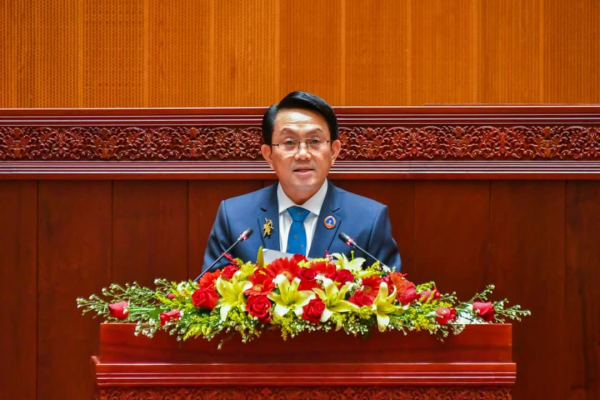KPL
Mr. Bounta Thepphavong, Chairman of the National Assembly's Culture and Society Committee, representing the National Assembly Standing Committee, addressed the government's report on the implementation of education-related strategies at the ongoing 8th Ordinary Session of the National Assembly’s 9th legislature on Nov 22.

(KPL) Mr. Bounta Thepphavong, Chairman of the National Assembly's Culture and Society Committee, representing the National Assembly Standing Committee, addressed the government's report on the implementation of education-related strategies at the ongoing 8th Ordinary Session of the National Assembly’s 9th legislature on Nov 22.
The strategies include the National Education System Reform Strategy and the National Human Resource Development Strategy.
While the National Assembly unanimously supported the government's report, the Standing Committee proposed two strategies to ensure better implementation of the education development plan and the national human resources development strategy.
These strategies are for the government and relevant sectors to study and consider:
National Education Reform Strategy:
Political and Ideological Education: The government should continue prioritizing political-ideological education to ensure that teachers uphold strong political values, ethics, morality, patriotism, and a commitment to greater diligence.
Law and Curriculum Revisions: The government should revise and create new laws and regulations as necessary. There should also be a focus on improving curricula in both general education and vocational education. Additionally, the duration of schooling should be adjusted to 12 years, following a 6+3+3 system.
Coordination and Management Improvement: Strengthen the coordination mechanisms and working methods of village-level education development committees to ensure the effective management and use of funds contributed by parents and communities.
Student Retention and Enrollment: Educate students on the importance of education to reduce the dropout rate and expand enrollment opportunities at all grades. Efforts should be made to address the issue of villages with schools but no teachers, as well as villages with teachers but few students.
School Infrastructure and Environment: Strive to expand school lunch programmes and improve educational infrastructure. This includes building dormitories, classrooms, reading rooms, and providing textbooks, teaching materials, sports equipment, and art supplies. Additionally, creating an attractive school environment will encourage students to stay in school.
Budget Adjustments and Policy Implementation: Adjust the education budget as required by law and continue efforts to implement Resolution No. 09/LP which includes 5 policies and 10 measures to address teacher shortages, and 3 policies and 12 measures to reduce student dropouts and promote vocational education.
National Human Resources Development Strategy Evaluation and Alignment: The government and the National Commission for Human Resources Development should continue summarizing and evaluating the implementation of the national human resources development strategy 2025.
This evaluation should highlight achievements, challenges, and future directions that align with the country’s political and socio-economic development plans.
Preparation for Sustainable Development: The strategy should lay the foundation for transforming the country from the least developed country status to one that meets the Sustainable Development Goals (SDGs) by 2030. This includes creating a population of skilled, knowledgeable, professional, and capable individuals who can meet the labor market needs and support the country's socio-economic development.
Regional and Global Integration: Efforts should be made to gradually integrate Laos into the regional and global economies, ensuring the country can compete internationally.
Building Infrastructure for Human Resource Development: Continue to improve infrastructure and create an environment that facilitates access to education, health, labor, and social welfare services for all members of society.
Developing Skilled Workforce: Develop and train teachers, doctors, and technicians with the necessary skills in labor, farming, and animal husbandry. This will help build confidence among entrepreneurs and society at large.
Salary and Wage Policies: It is proposed that the government study and implement policies to increase the salaries or living wages for civil servants and increase the minimum wage. These changes would help attract more people to study, reduce dropout rates, and curb the trend of young people seeking work abroad.
KPL